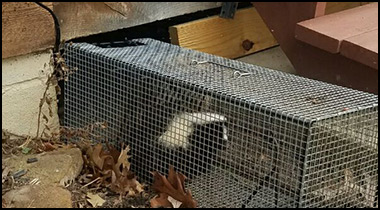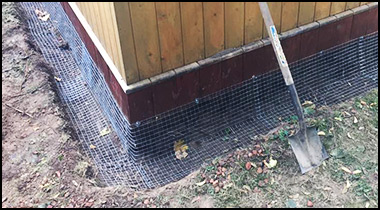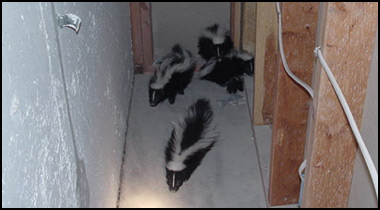Houston Skunk Removal Resources
Skunk Rehabber - Texas Wildlife Rehab Coalition: (713) 468-8972
Free Harris County Animal Services: (281) 999-3191
Humane Wildlife Trappers of Houston: 346-415-5001
If you need skunk control in Houston, you have a few options. First, you can attempt to solve the skunk problem yourself by reading our do-it-yourself guide. If you need outside help, you can also call Harris County Animal Services to see if they have any free resources or help for you - however, they primarily deal with dog and cat concerns. You can also call a local Houston wildlife rehabber, as they are typically a great resource for advice that is in the best welfare of the animal. If as a last resort you must hire a professional company, we recommend Humane Wildlife Trappers of Houston at 346-415-5001. To learn more about them or check their skunk removal prices, visit houstonpestanimal.com.

Houston Skunk Trapping and Removal

Preventative Repairs & Exclusion

Houston Skunk Removal From Structures
In many cases, preventative measures can solve your Houston skunk problem - keep garbage secured, pet food indoors, and most of all when it comes to skunks, secure the perimeter of your shed, porch, deck, or house with a barrier - lattice or steel mesh is good, and it keeps Texas skunks from going under the structure. If trapping and removal of the skunk is the only option you have, please do so with the help of a local agency or professional company who knows how to do it humanely and legally. Browse the resources of this site for more educational information.
Frequently Asked Questions:
Prevention: How to Keep Skunks Away
What to do with a skunk after I catch it?
Is it legal for me to trap a skunk?
How to remove skunk odor
Is a skunk active during the daytime rabid?
What does skunk feces look like?
Houston Skunk Control Information: Why do Skunks Dig?
Skunks may dig for a variety of reasons. The primary reason is for food. Their food preferences are generally animals that like to burrow. Some examples would be mice, bird eggs and insects. While garbage does not qualify as a burrowing insect garbage is a mainstay. The most favorite meal for the skunks prefer are the insects. The holes are generally the size of the their nose and loose dirt generally surrounds the hole. You most often find the holes will appear over night. This is because skunks are not only nocturnal but are all weather animals. Because they are opportunistic foragers it is likely that you will find a skunk anytime of the night.
Skunks will dig homes as well. They are most likely to build their homes under your porch, patio or a shed. The holes that skunks dig are not really noticeable as they range between 4-6 inches in diameter. Skunks have both strong nails and forefeet. This makes them strong and capable diggers. Preferring tree hollows, brush, hollowed out logs and under porches, decks and shed if nothing else is available. At times the skunk will use an abandoned burrow. Should you notice a faint smell of skunk, search for holes as already described. A skunk will not travel more than 2 miles from water.
As with many animals with patience you can rid your residence of skunk. Skunks bear their children during the early months of spring some time around April - June. The babies will stay with their mother for 4 months within the burrow.
While skunk holes may be small in diameter, damage may still be on a larger scale than anticipated. One of the insects that skunks are attracted to is the grub. Getting to the grubs may require deeper and sometimes larger holes. In order to get to eggs the skunk may very well raid your chicken coop.
So now that it has been established why a skunk would dig. There are reasons why you do not want the skunks around your property. Yes, the digging which may create weaknesses in the foundations of your deck, sheds and/or your porch.
Keep you property as skunk free as possibly. If sealing up burrows around your home be sure that both Mother and babies are out. Keep your distance, skunks carry many diseases some are indeed life - threatening
Remember, for free services you can try (713) 468-8972 or (281) 999-3191, but if you need to pay for professional help, check the prices at the houstonpestanimal.com website. Or follow our do-it-yourself guide!

